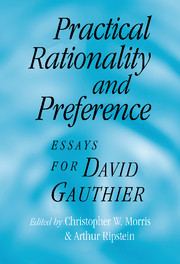Book contents
- Frontmatter
- Contents
- List of Contributors
- Practical Reason and Preference
- What Do Expressions of Preference Express?
- Preference
- Rational Temptation
- Bombs and Coconuts, or Rational Irrationality
- Are Intentions Reasons? And How Should We Cope with Incommensurable Values?
- Two Forms of Practical Generality
- Psychology for Cooperators
- Which Games Should Constrained Maximizers Play?
- The Strategy of Cooperation
- We Were Never in Paradise
Which Games Should Constrained Maximizers Play?
Published online by Cambridge University Press: 11 January 2010
- Frontmatter
- Contents
- List of Contributors
- Practical Reason and Preference
- What Do Expressions of Preference Express?
- Preference
- Rational Temptation
- Bombs and Coconuts, or Rational Irrationality
- Are Intentions Reasons? And How Should We Cope with Incommensurable Values?
- Two Forms of Practical Generality
- Psychology for Cooperators
- Which Games Should Constrained Maximizers Play?
- The Strategy of Cooperation
- We Were Never in Paradise
Summary
Much of the response to Morals by Agreement has focused on David Gauthier's most philosophical claims: Is constrained maximization rational? Is it moral? While these traditional questions are important, they might lead us to overlook two features of Gauthier's innovative project. First, he develops Rawls's constructive approach to moral theorizing, seeking to invent new devices and principles that can meet pragmatic and moral demands. In particular, Gauthier offers his constrained maximizer as a new kind of agent who benefits by her moral constraint. Significantly, Morals by Agreement ends with a discussion of Nietzsche's question: “ ‘To breed an animal with the right to make promises – is not this the paradoxical task that nature has set itself in the case of man?’ … Such an animal is able to interact with its world in a new and distinctive way, which we have sought to capture in the conception of constrained maximization.” But mention of Nietzsche and Rawls reminds us that moral innovation is often controversial. As in the case of Rawls's difference principle, Gauthier's principle of constrained maximization has struck some critics as less demanding than morality requires. This leads to the second feature of Gauthier's approach: His appeal to rational choice suggests new ways to address such criticisms, by allowing a sophisticated pragmatic theory to select the best among various approaches (moralized and not) to problematic interaction.
Information
- Type
- Chapter
- Information
- Practical Rationality and PreferenceEssays for David Gauthier, pp. 173 - 188Publisher: Cambridge University PressPrint publication year: 2001
Accessibility standard: Unknown
Why this information is here
This section outlines the accessibility features of this content - including support for screen readers, full keyboard navigation and high-contrast display options. This may not be relevant for you.Accessibility Information
- 1
- Cited by
